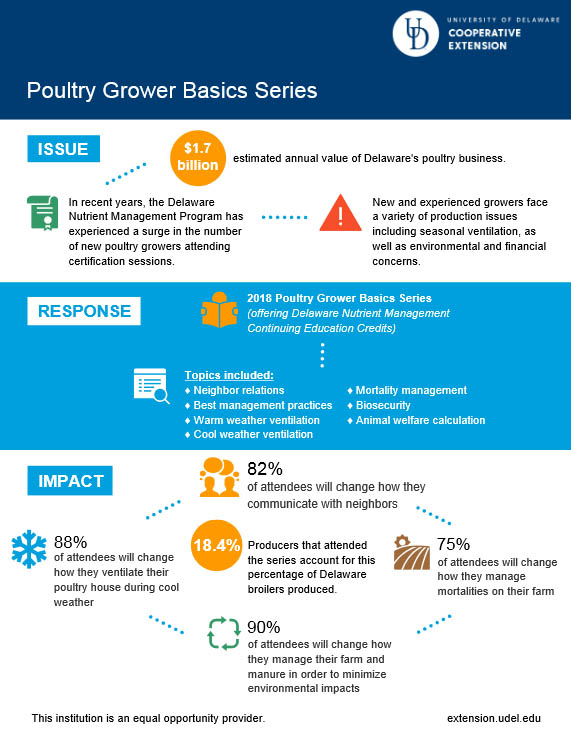
Poultry Grower Basics Series (2018)
- Ask Extension
- Health & Well-being
-
Agricultural Programs
- Agribusiness
- Animal Science
- Beginning Farmer Program
- Commercial Crops
- Commericial Horticulture
- Delaware Soil Testing Program
- Disease Management
- Farm Vitality and Health Project
- Irrigation
- Nutrient Management
-
Insect Pest Management
- Insect Trapping Program
- IPM Hot Topics
- Commercial Field Crop Insect Management
- Commercial Field Crop Disease Management
- Commercial Fruit & Vegetable Crop Pest Management
- EIPM Implementation Projects
- Pollinators
- Research and Extension Demonstration Results
- Brown Marmorated Stink Bug (BMSB) Management, Research, and Resources
- Publications
- Pesticide Safety Education Program
- UD Plant Diagnostic Clinic
- Variety Trials
- Weed Science
- Certified Crop Advisor Program
- Poultry Biosecurity
- 4-H
-
Horticulture
- Climate Variability and Change
- Delaware Soil Testing Program
- Forestry
- Lawn and Garden
- Master Gardeners
- Master Naturalist Program
-
Nutrient Management
- Nutrient Management Certification
- Continuing Education for Nutrient Management
- Nutrient Management Planning Resources
- Commercial Nutrient Handler Resources
- Poultry Litter and Manure Management
- Turf Management
- Agriculture Notebook
- Horticulture Handbook
- Agriculture & Horticulture Handbooks
- Crop Production
- Soil Fertility
- Delaware Climate Change Coordination Initiative (DECCCI)
- Salt Impacted Agricultural Lands

ISSUE
Poultry is Delaware agriculture’s main economic engine, with an estimated annual value of $1.7 billion (DPI). In recent years, the Delaware Nutrient Management Program has experienced a surge in the number of new poultry growers attending certification sessions. New and experienced growers face a variety of production issues including seasonal ventilation, as well as environmental and financial concerns.
RESPONSE
We developed the 2018 Poultry Grower Basics Series, which consisted of a series of three unique programs in Kent and Sussex counties held throughout the year to address issues faced by new growers. The courses also served as an excellent refresher for experienced poultry growers. Each program was approximately two hours long and was offered in the afternoon and evening in each county to accommodate growers varied schedules. Topics presented during the programs include neighbor relations, best management practices, warm weather ventilation, cool weather ventilation, mortality management, biosecurity, animal welfare and settlement calculation. All of the programs offered Delaware Nutrient Management Continuing Education Credits.
IMPACT
During the 2018 Poultry Grower Basics Series, total attendance was 152 for all five programs. A total of 140 participants completed the program evaluation (92%). Respondents reported that a total poultry farm capacity of more than 9.3 million birds. Delaware poultry farms produce 252 million broilers and an average of five flocks annually. Producers that attended the series account for 18.4% of Delaware broilers.
After the programs on Jun. 11, 74 participants replied:
- 94% (70) learned something new about neighbor relations;
- 95% (74) learned something new about best management practices; and
- 93% (69) learned something new about warm weather ventilation.
Following two programs on Oct. 17 participants indicated:
- 93% (56) learned something new about cool weather ventilation; and
- 91% (55) learned something new about mortality management.
Participants were also asked if they would implement or change a practice. Of respondents from both dates:
- 82% (61) will change how they communicate with neighbors;
- 90% (67) will change how they manage their farm and manure in order to minimize environmental impacts,
- 88% (53) will change how they ventilate their poultry house during cool weather; and
- 75% (45) will change how they manage mortalities on their farm.
The University of Delaware is an Equal Opportunity Institution and Provider. Visit UD’s Office of Equity & Inclusion to learn more.
Additional Links
531 South College Avenue Newark, DE 19716 (302) 831-2501
